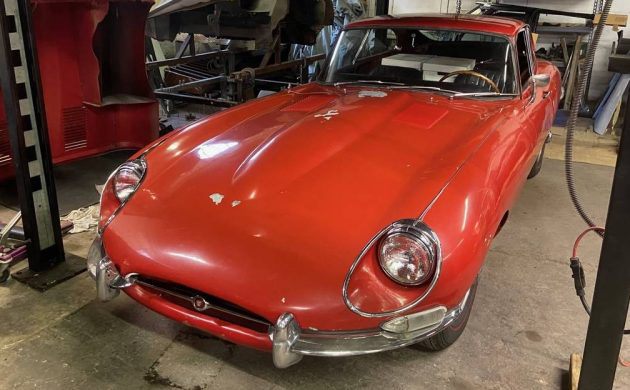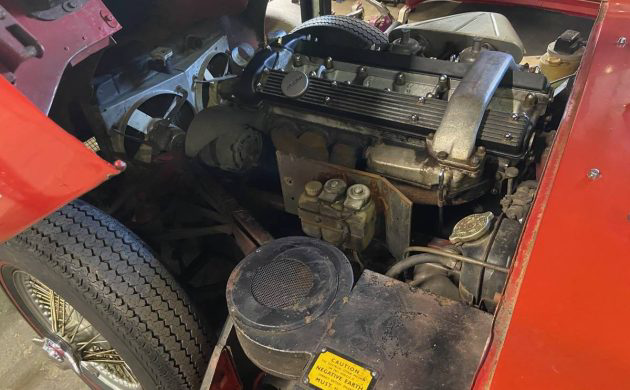The Jaguar E-Type is one of the more fascinating vehicles from the classic scene. Even rough and rusty examples command impressive prices, while pristine examples can be six-figure vehicles. This 1967 E-Type is a survivor, and while it would look stunning if fully restored, its solid nature means that reviving it and returning it to active service is viable. The seller has listed the E-Type here on Craigslist in Flemington, New Jersey. They set their price at $58,000, and I must say a big thank you to Barn Finder Mitchell G. for spotting this beauty.
Jaguar officially produced the E-Type through three distinct series. However, a transitional version made in 1967 and early 1968 carried design features from both the Series 1 and Series 2 variants. It became known as the Series 1½, and our feature car is one of those vehicles. The exterior underwent several changes, with the most obvious being the deleted headlight covers, and the winged nuts for the knock-off wire wheels making way for hex nuts. This is one of those cars, although someone has retrofitted the winged nuts to the wheels. This was common, and reversing that change for authenticity would be easy. Carmen Red was available from the car’s release until the end of 1967, and while this car carries that shade, I’m unsure if it is original. The various chips across the exterior reveal traces of what appears to be Cream paint, suggesting a color change is possible. Only an in-person would confirm this, and the same process would verify whether this Jag is as rust-free as the photos indicate. There is no evidence of problems in the lower extremities or rear valance, and the interior’s lack of carpet reveals floors that look solid. Checking the rear hatch opening would be worthwhile, but the initial impression is positive. The trim and bumpers look okay, although a new owner intent on a high-end restoration might send some pieces to the platers. The glass is clear, and the wire wheels are in good order.
The 4.2-liter DOHC six occupying this Jaguar’s engine bay confirms this is a Series 1½ model. It features the Black ribbed valve covers that were a hallmark of later engines, along with the twin cooling fans. The seller states the car is numbers-matching, meaning the motor sent 265hp and 283 ft/lbs of torque to the rear wheels via a four-speed manual transmission in its prime. A ¼-mile ET of 14.7 seconds would have been a piece of cake, and that beautiful motor should have hauled this gem to 131mph. We know this E-Type is mechanically complete, but the waters become muddy when we focus on its overall health. The seller doesn’t specify whether it runs or drives, but since they appear approachable, that question is worth asking.
Black leather was the most popular interior trim choice for E-Type buyers, which is what we find inside this Jag. The carpet and radio are missing, but it is otherwise complete. The interior is serviceable if the new owner’s short-term aim is revival, but it would undoubtedly respond to total restoration. Kits are readily available, and although they start at an eye-watering $5,000, the potential value of this classic, if returned to a pristine state, should justify the expense.
What would be your plans if you found this 1967 Jaguar E-Type parked in your workshop? Would you commit immediately to its restoration, or would revival be a short-term goal as you contemplate your strategy? It is hardly an affordable project candidate and will require a reasonable outlay to return to a pristine state. However, it could be worth it. Values have suffered during the past year, but a high-end restoration could yield a value of around $90,000. However, perfection could push it into six-figure territory. It will be fascinating to gauge your opinion and to learn whether we have any readers who might pursue this classic further.







Always loved the E type, but this one, I can’t decide between preservation or restoration, they both have merits.
Can’t lose on this one, however with the poor quality of parts these days not even mentioning scarcity/costI would just replace what’s missing and leave it alone
Think I’d do a good repaint and drive it. All the small bits can come as wanted and the interior can be redone after recovering from the purchase price. It is fun to hammer down a Jag if for no other reason the great noise coming out of that beautiful engine.
Do the minimum required to make it safe and reliable and drive it.
For what it’s worth, I used to live in the area: the shop that has it always had a good reputation As a result you’d see XKEs and other British exotica on the road more frequently than you’d normally expect.
$90.000 for a high-end restoration? Last time I saw an E-type being restored, it costed 180.000€, plus the car, of course. 3000+ man hours + parts. And the car was in similar condition as this one, quite original, not much rust. So I really am curious how much some Jag specialist would charge per hour in US, those figures above are Eastern European ones. In Western Europe, man hour price is double at least.
Fortunately I can do my own complete restorations but the cost of materials and things like replating keep any hope of a cheap restoration a pipe dream. There is gas for the welder, sand paper. masking tape etc., primer, sealers, paint, fasteners and it just goes on. Doesn’t even get close to what it takes to build or rebuild engines, transmissions, running gear, all of which doesn’t come cheap. Our present build is a ’60 Austin Healey Sprite bought as a rolling chassis for $1,500. Right now it sits ready for paint with a little short of $30,000 in it. You can guess what this XKE would take after all that money and effort required to do the same to it.
Not easy to persuade naive greenhorn that these things all cost like crazy. That it’s an extremely expensive hobby to run. If I understand you correctly, you have $30k, not counting labor, since you are doing it yourself?
Do a mechanical refresh and drive it. Unless one is going to restore it right, no reason to repaint as to properly do that is a complete disassemble of the car….
not a 67
Uncovered headlamps, rocker switches, two carb. for starters. I had a 68 that had all of these. Am I misinformed?
Both of you, Robert J Mulvaney and Robert F are correct. This car is a 1968 and NOT a 1967. Between September of ’67 up to the last day before the Christmas of 1967 holidays, the E Type got those uncovered headlamps, BUT DID NOT GET THE ROCKER SWITCHES and separate clock gauge. It was not until January 1, 1968, that the revised dashboard came along, with the twin Zenith-Stromberg carbs for the American market. This car is a ’68. If its registration were to say ’67, then I can guarantee that there is some monkey business with the documentation.
Adam: good write-up, but I find it amusing how you talk about ONE seller (“…the seller”)…but then suddenly switch to the plural to tell us that this ONE person suddenly becomes plural (“…THEY set THEIR price…)…something known as “Pronoun/Subject agreement” You also mention a top speed of 131 mph. For an American ’68 coupe with 246 bhp it is actually 142, given the gearing. As for prices having gone down, a competitor of Barn Finds very recently put out an article on E Type values, saying that for E Types in great original condition or correctly restored, values have actually appreciated. This competitor whose name begins with an “H” and ends in an “s” says that this is very much the case, as long as one weeds out cars such as coupe-to-convertible conversions, and other such anomalies that distort values.
The process by which S1 evolved to become S2 was a little haphazard and although the factory didn’t use the designations, collectors came to define two of the transitional late S1 specification cars as S1.25 & S1.5 (also as 1¼ & 1½). Although no exact records of specification were at the time maintained by the factory, the S1.25 run began in early 1967 when a batch for the US market was produced with the open headlights, a change which was phased into the rest of production as existing stocks of the older parts were exhausted, this completed by mid-year. However, not everything done at Jaguar was exactly sequential and a number of S1.25 cars sold there were fitted from new with the covered headlights. The rocker switches seem to have been retained in all S1.25 E-Types. What came to be called the S1.5 began production between August-October 1967 (there was overlap with the final S1.25 specification cars) which were distinguished by raised headlights, the rocker switches (and on US cars twin Stromberg carburetors replaced the triple SUs) and other detail changes. At this point, the earlier teardrop tail lights were still fitted. Finally, the S2 cars proper arrived for 1968 with the taillights now mounted below the bumpers.
I seriously doubt that this E underwent a color change. If it did, it was exhaustingly thorough!
DD… I should have mentioned that this is a race car we are building from a rolling chassis that had nothing on it but enough suspension to roll it up on the trailer. All the running gear, brakes, etc. and things like a $9,000 transmission and the rebuild of a $22,000 race engine. Tim Suddard of Classic Motorsports magazine just finished a restoration of a Bugeye Sprite like ours and approached 50K by the time he finished it. He’s got the whole build in pictures at www/classicmotorsports.com. Pretty interesting stuff.